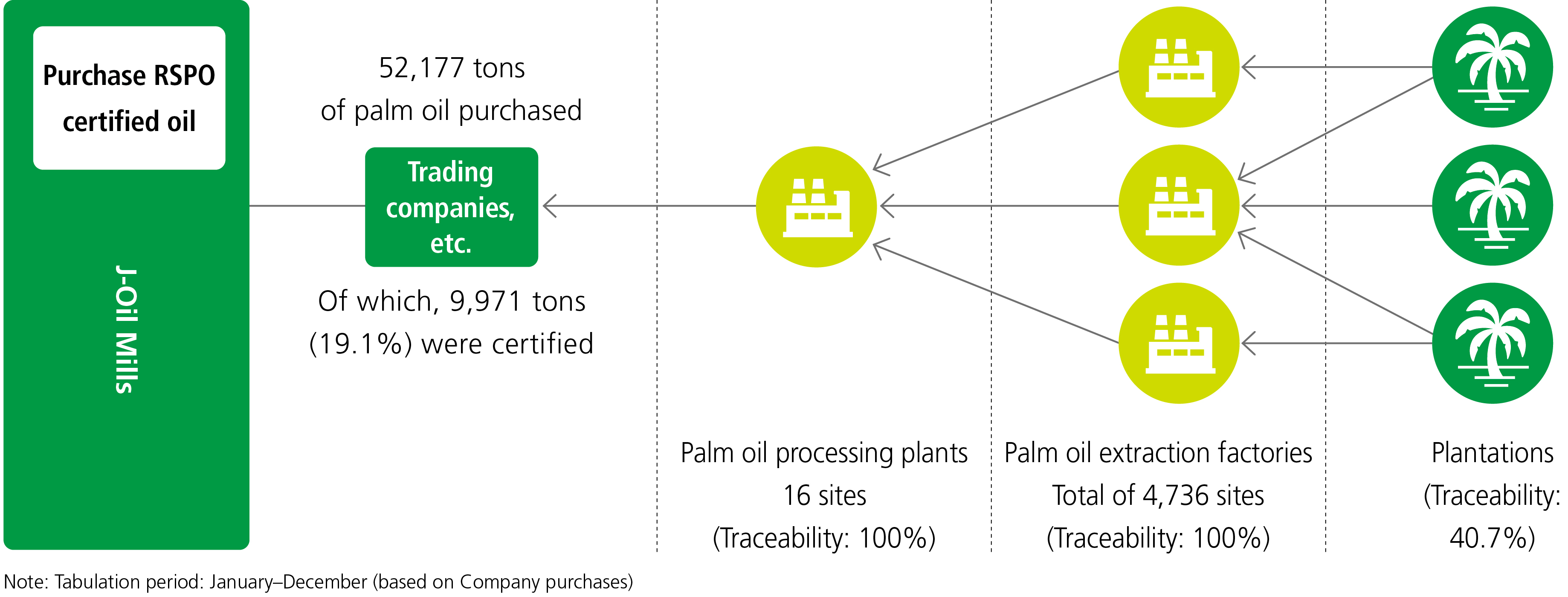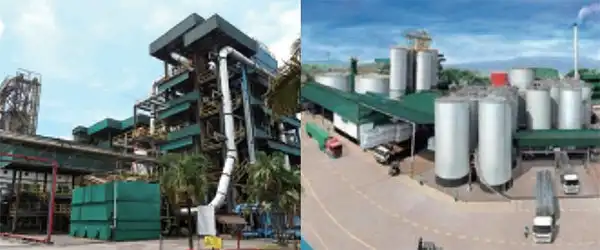Sustainable sourcing
Overview
As a company that creates products from the blessings of nature and provides valuable products to our customers, sustainable procurement of raw materials such as plants is an important issues. In recent years, climate change has threatened the growth of plants, and as a result, there is an increased risk that the price of raw materials will fluctuate significantly. In addition to the problems of the natural environment, it is also necessary to actively address issues such as ensuring safety and quality, as well as the human rights of workers. In order to procure sustainable raw materials, J-OIL MILLS has established a "Sustainable Procurement Policy and Standards" based on its "Environmental Policy" and "Human Rights Policy" and will promote sustainable procurement activities throughout the supply chain.
Soybean procurement policy
soybean are one of the important raw materials that support our business activities. In addition to uses such as edible oils and various soybean processed foods, they are also widely used for non-edible purposes such as biodiesel fuel and livestock feed, and the international demand for soybean is steadily increasing. On the other hand, it has been pointed out that soybean production activities may cause environmental problems such as deforestation, and social problems such as human rights violations of indigenous peoples and workers.
We procure soybean mainly from the United States and Brazil, manufacture products, and supply them to our customers. When procuring raw materials, we work to improve sustainability based on the "Sustainable Procurement Policy and Standards." With regard to soybean, we have specifically established a "Soybean Procurement Policy" to ensure that procurement takes into consideration the environment and human rights, and we are a member of the Roundtable on Responsible soybean (RTRS*). As a company that supports food, we aim to improve traceability to fulfill our social responsibility, and strive to procure soybean in a transparent and responsible manner.
*Round Table on Responsible Soy Association: A non-profit organization established in Zurich, Switzerland in 2006 that promotes the expansion of responsible soybean production, trade, and use.
Palm oil procurement policy
Palm oil, which is pressed from oil palms, is an indispensable oils and fats for our lives, but in recent years, deforestation, the resulting loss of biodiversity, and human rights issues of local workers have been pointed out in the production process. In order to carry out responsible sourcing of palm oil, which is one of the most issues raw materials in the oils and fats, J-OIL MILLS joined the "Roundtable on Sustainable Palm Oil" (RSPO) in 2011 and obtained Plant certification for handling RSPO-certified palm oil in Yokohama Plant. In addition, in 2020, we established our approach to palm oil procurement in consideration of the environment and human rights as "Palm oil procurement policy."
Palm oil procurement policy (PDF:851KB)
(Japanese text only)
Palm supplier traceability survey
Palm oil traceability is the process of tracing the entire palm oil supply chain and identifying each step, with the aim of ensuring sustainable production methods, environmental protection and social responsibility.
We began traceability in fiscal 2018, achieving a 100% tracing rate to palm oil refineries in fiscal 2019 and a 100% tracing rate to palm oil mills in fiscal 2021. Our current quantitative materiality target is to achieve 100% traceability to plantations by fiscal 2030. The tracing rate to plantations in fiscal 2023 is 40.7%, and the target for fiscal 2024 is 50%.

Initiatives with GH (Good Hope)
Premium Vegetable Oils Sdn Bhd (PVO), which has a capital and business alliance with J-OIL MILLS, is a Malaysia-based oils and fats processing company. PVO's parent company, Premium Nutrients Private Limited (PNPL), is a wholly owned subsidiary of Goodhope Asia Holdings (hereinafter referred to as GH), a major palm oil plantation and oils and fats production company headquartered in Singapore.
GH applies principles such as No deforestation, No peat, No exploitation (NDPE) throughout its supply chain and has been highly praised for its sustainability efforts. GH also supports sustainable economic activities in the areas where its farms are located and in the surrounding communities, including supporting small farms and initiatives healthcare and educational facilities on its farms. We would like to promote our collaboration with GH as initiatives for sustainable procurement.
GH company website
http://www.goodhopeholdings.com/

Initiatives to improve traceability
The food environment faces a wide range of issues.
The supply and demand of grains and vegetable oils has been tightening due to factors such as reduced grain harvests caused by climate change and labor shortages caused by the global spread of COVID-19, resulting in an increased risk of price fluctuations.
Additionally, when procuring raw materials, it is also important to ensure safety and quality, and to respect the human rights of workers.
In order to ensure sustainable procurement of raw materials, we have been working to improve the traceability of palm oil and have also begun collecting information on soybean sourcing.
Companies must be proactive in solving environmental and social issues by being sensitive to new issues and needs, fulfilling their responsibilities, and providing new value. We will pursue sustainability in all areas, including the economy, environment, society, and working conditions, and promote ESG Management.
-
initiatives for 2024
Year and month Activity content November 2024 Visiting olive producing regions and suppliers in Spain November 2024 Participation in RSPO Annual General Meeting November 2024 Malaysia Palm plantation and supplier visits November 2024 Visit to an olive oil supplier in Australia October 2024 Visit to US and Canadian soybean and canola exporters September 2024 Visit to US soybean producing areas and export ports August 2024 Visit to Canadian canola producing areas and export ports August 2024 Visit to soybean-producing areas in the U.S. and canola producing areas in Canada July 2024 Visiting olive producing regions and suppliers in Greece and Italy July 2024 Visit to Canadian canola producing areas and export ports March 2024 Visit to an Australian canola exporter March 2024 Visit to Brazilian soybean producing areas and export ports February 2024 Visit to an olive oil supplier in Spain
-
initiatives for 2023
Year and month Activity content December 2023 Greece, Türkiye Olive oil farm inspection/supplier visit October 2023 Visit to olive oil farms and suppliers in Spain and Italy September 2023 Visit to U.S. soybean producing area July 2023 - Visit to olive oil suppliers in Spain and Italy
- Visit to Dutch and Belgian butter suppliers
- Canadian canola export port visit
March 2023 - Inspection of soybean production areas and export ports
- Visit to US soybean export port
February 2023 - Visit to olive oil supplier in Spain
- Visit to Irish butter supplier
-
initiatives for 2022
Year and month Activity content November 2022 - Participation in RTRS Annual General Meeting
- Participation in RSPO Annual General Meeting
October 2022 Inspection of production areas in America and Canada September 2022 - Visit to olive oil supplier in Spain
- Visit to Irish butter supplier
April 2022 - Visit to an olive supplier in Spain
-
2020 initiatives
Year and month Activity content February 2020 Visit to Spanish canola supplier
-
2019 initiatives
Year and month Activity content November 2019 - Visit to olive oil plantations in Spain and Italy
- Participation in RSPO Annual General Meeting
August 2019 - Visit to a variety corn farm for starch in America
- Visit to palm oil supplier in Indonesia
July 2019 Visit to Canadian canola mills June 2019 Attendance at RTRS Annual General Meeting May 2019 - Australian olive farm visit
- Visit to palm oil supplier in Malaysia
*There will be no overseas tours in 2020 and 2021 due to the coronavirus pandemic.
Initiatives with suppliers
Collaboration with suppliers is important to improve the effectiveness of sustainable procurement. We have established a "Sustainable Procurement Policy and Standards" and ask not only our own company but also our suppliers to comply with them. In addition, from fiscal 2022, we will conduct surveys of raw material and material suppliers using the "CSR Procurement Self-Assessment Questionnaire" (GCNJ Common SAQ*1) created by the United Nations Global Compact Network Japan to check the status of sustainability initiatives. In fiscal 2023, we expanded the scope and conducted additional surveys. We will continue to conduct surveys on a regular basis and strive to build a responsible supply chain.
*1This questionnaire was created by the UN Global Compact Network Japan and is based on international norms and consists of questions reflecting 10 principles in four areas: protection of human rights, elimination of unfair labor practices, response to the environment, and anti-corruption.- Survey target: Raw materials/materials suppliers
- Survey target company coverage rate: Approximately 80% of raw material/materials procurement amount
| SAQ score rate/Evaluation | Supplier | Feedback/Improvement actions |
|---|---|---|
| A rating Score rate of 70% or more |
82.8% |
|
| B rating Score rate: 40-70% |
17.2% | |
| C rating Score rate less than 40% |
0.0% | |
| Answer total | 100% |
(2022-2023 cumulative results)
*For suppliers who have resubmitted the questionnaire, the most recent results will be used to tally the data.
